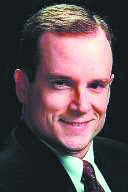Time to build state reserves
Published 12:00 am Monday, August 11, 2014
RALEIGH — We don’t know what the composition of the North Carolina General Assembly will look like after the November election. Republicans are favored to hold their majorities in both legislative chambers, to be sure, but their edge could shrink a lot, shrink a little, or stay roughly the same (a net increase in Republican-held seats would be surprising given their current supermajorities).
Regardless of what voters decide to do this year, many lawmakers will begin the 2015 legislative session with ambitious fiscal goals. There are Republicans, I hear, who favor another round of large-scale tax reductions. There are Democrats who believe the state should spend vastly more on education and social programs after years of either slow growth, no growth, or budget cuts. Furthermore, members of both parties will want to offer large pay raises to state employees (teacher compensation was the primary focus in 2014) and spend more money on capital projects across the state.
Today I’ll offer my own top fiscal priority for 2015: saving for a rainy day.
The 2014-15 General Fund budget enacted by Gov. Pat McCrory and the General Assembly will spend just over $21 billion on education, public safety, Medicaid, and other services. Contrary to the assertions of some overworked reporters and overwrought liberal analysts, there is no gaping hole in that budget. State revenue forecasts were adjusted downward a bit last spring, due to slower-than-expected wage growth. There has been no empirical justification for revising them again.
Still, $21 billion is a lot of budgetary authority. It funds lots of salaries, both public employees and private vendors, as well as lots of services. If some unforeseen event were to knock the state budget out of kilter — a national economic slowdown, for example, or a natural disaster — it would be helpful for budget officials to be able to draw on state financial reserves. Right now, those reserves are growing but still below optimal levels.
North Carolina’s primary savings reserve, the rainy day fund, originated in the early 1990s. By law, it automatically receives one-fourth of any unreserved credit balance in the General Fund. Of course, lawmakers can always add more money to the account than is required. As of late July, the rainy day fund contains approximately $652 million. There are also separate reserves to fund repairs and renovations of state facilities and to cover disaster relief. Each contains about $12 million.
The 2014-15 budget didn’t add to these reserve accounts. However, it put $186 million into a special Medicaid reserve. Senators believe this money will be required to cover unforeseen rises in Medicaid costs. House members and the McCrory administration think that unlikely. For the sake of argument, let’s go with the optimists here and treat the $186 million as a net addition to reserves.
That gives us a total of about $862 million, or about 4 percent of the current General Fund budget. It’s about half of what North Carolina expects its localities to keep in reserve, on average, and about half of the explicit funding goal for the rainy day fund by itself.
I know there’s nothing particularly exciting about saving money. But I’d rather live in boring times than experience the excitement of an unforeseen budget crisis.
Both sides need to imagine what might happen if a massive hurricane hit the coast or the current (relatively weak) national economic recovery gave way to another recession. Republicans would face pressure to rescind their 2013 tax reform and hike tax rates. Democrats would face pressure to vote for another round of budget cuts they’d dislike.
I recommend that the General Assembly make it a high priority to add $400 million to state reserves in each of the next two years, solely or mostly into the rainy day fund. If you’re a fiscal conservative, consider it insurance to protect the long-term stability of tax reform. If you’re a fiscal liberal, consider it insurance to safeguard your favorite spending program.
There is nothing wrong with playing it safe — particularly when the game is played with other people’s money.
Hood is president of the John Locke Foundation.


